Romeo and Juliet is a timeless tragic tale. A new film version of Shakespears’s play written by Julian Fellowes (Downton Abby) and directed by Carlo Carlei is out in theaters now. It stars Hailee Steinfeld (Juliet), Douglas Booth (Romeo), Damian Lewis , and Paul Giamatti.
During the press day for the movie Stienfield, Booth, Carlei, Kodi Smit-McPhee, and the ever-charming Fellows gave insight into working on the film.
Hailee Steinfeld discussed her appreciation of small romantic gestures, the challenge of tackling Shakespearian language, and how as a sixteen year old she found it easy to relate to the young but strong and determined Juliet. Douglas Booth who plays Romeo talked about getting to learn sword fighting, his path to gaining a deeper appreciation for the play through his experiences in shooting, and talked about dealing with the challenge of wearing period costumes in chilling weather on set.
Booth: It was freezing cold, you can see your breath in the movie. I mean, Hailee’s dress, the chest was open. Sure, it’s pretty but it won’t keep you that warm. I had a bit more padding. So, uncomfortable in one sense, but the costumes were designed and fitted, all custom made.
Downtown Abby writer Julian Fellowes talked about why he felt the story of Romeo and Juliet was ready for a film version for a new generation.
Fellowes: There are certain stories that won’t die. They just continually get reinvented. A lot of them are kind of generic, Sleeping Beauty, Cinderella, that are invented in the folk lore of Italy, or German, or wherever. This is a play written by a guy who sat down at a table and wrote for a company of actors he was leading over half a millennium ago and he touched something in that means every generation wants to redo it and re-see it. Sometimes it’s been turned into modern musicals about the back streets of New York, or it’s been made modern and it’s in an ice-rink or an underground garage or everyone is in Nazi uniforms. But the point is we keep going back to it, and I think the reason we go back to it is that it touches something at our very core. And that’s why it seemed right to give this generation their own Romeo and Juliet, and not constantly get out a fuzzy VHS of Zeffirelli’s and also to make it for once the romantic story, and not put everyone in jackboots or ballet pumps, but give them the romantic lyrical Romeo and Juliet- The Three-Kleenex Version.
Fellowes explained his process for making his choices about how to approach adapting the play to film.
Fellowes: We need our stories to told in a shorter period, a three and a half hour play goes down to a hundred minutes. We were very keen to appeal to an audience beyond that of Shakespeare scholars, but we wanted to keep the feeling there, keep the intention, and keep the language. The advantage of a film is that you can follow the visual storytelling, It’s not like a modern play where you are wanting to get away from the setting with the sitting room and sofa and the two chairs that makes you want to cut your throat when the curtain goes up. For me that is a choice that I felt Carlo really went with, going with Shakespeare’s locations, but opening them up and making them real.
Fellowes also praised Paul Giamatt’s for his performance in the movie and his ability to turn what’s normally a tangential role and take to another level.
Fellowes: I loved what he did with the Friar! And I think it put a kind of heart into the center of the story. He’s sometimes played as a kind of a fool, and sometimes played as manipulative and quite cold and Paul dispensed with all of that. It’s extraordinary how you can take the same words on the page and make a different man out of them. He put a kind of gentleness and kindness into the role that greatly improved it. That was him not me, and I was very pleased. He made this decision for Romeo to be his son, because he made this choice to lead a celibate life, the Friar not Paul, and I thought it added so much to the end that you had this sense of a loving father witnessing his son’s death.
Romeo and Juliet is out in theaters now.
By Laura Gaddy

